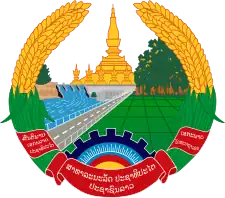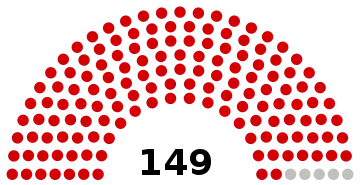| |||||||||||||||||
All 149 seats in the National Assembly 49 seats needed for a majority | |||||||||||||||||
This lists parties that won seats. See the complete results below.
| |||||||||||||||||
 |
|---|
|
|
Parliamentary elections were held in Laos on 20 March 2016.[1] Voters were presented with a single list from the Lao Front for National Construction, dominated by the Communist Lao People's Revolutionary Party (LRPP). The LPRP won 144 of the 149 seats, with pro-government independents winning the remaining five.
Electoral system
The 149 members of the National Assembly were elected from 18 multi-member constituencies with between three and fourteen seats using the first-past-the-post system.[2] Candidates had to gain the support of a local authority or a mass organisation to run for office, and election committees approve candidacies.[2] Due to a rise in the country's population, the number of seats was increased from 132 in the 2011 elections.[3]
Campaign
A total of 149 seats were contested by 211 candidates, including 50 women and 48 incumbent MPs.[1] Much of the election campaign was focused on economic development.[3]
Results
Of the 149 elected members, 73% were first-time MPs.[3]
 | |||||
|---|---|---|---|---|---|
| Party | Votes | % | Seats | +/– | |
| Lao People's Revolutionary Party | 144 | +16 | |||
| Independents | 5 | +1 | |||
| Total | 149 | +17 | |||
| Total votes | 3,657,026 | – | |||
| Registered voters/turnout | 3,733,932 | 97.94 | |||
| Source: IPU | |||||
Aftermath
Following the elections, the National Assembly convened on 20 April to elect Bounnhang Vorachith as president (replacing Choummaly Sayasone) and Thongloun Sisoulith as Prime Minister, replacing Thongsing Thammavong.[3]